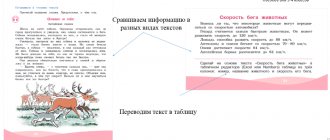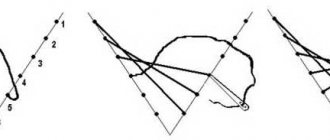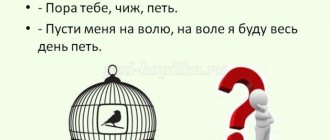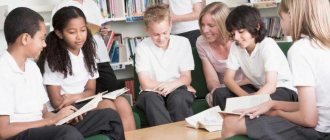Work program “Project activities” 3rd grade
- Explanatory note.
The program is designed in accordance with the requirements
- Federal Law of December 29, 2012 No. 273-FZ “On Education in the Russian Federation”;
- Federal State Educational Standard for Primary General Education, approved by Order of the Ministry of Education and Science of the Russian Federation dated October 6, 2009 No. 373 (hereinafter referred to as the Federal State Educational Standard for Primary General Education);
- The procedure for organizing and implementing educational activities in basic general educational programs - educational programs of primary general, basic general and secondary general education, approved by order of the Ministry of Education and Science of the Russian Federation dated August 30, 2013 No. 1015;
- Federal list of textbooks recommended for use in the implementation of state-accredited educational programs of primary general, basic general, secondary general education, approved by order of the Ministry of Education of the Russian Federation dated December 28, 2018 No. 345;
- List of organizations that produce textbooks that are allowed to be used in the implementation of state-accredited educational programs of primary general, basic general, secondary general education, approved by order of the Ministry of Education and Science of the Russian Federation dated 06/09/2016 No. 699;
- Sanitary and epidemiological requirements for the conditions and organization of training in educational institutions, approved by the resolution of the Chief
State Sanitary Doctor of the Russian Federation dated December 29, 2010 No. 189 (hereinafter referred to as SanPiN 2.4.2.2821-10);
- Order of the Education Committee dated 04/03/2019 No. 1010-r “On the formation of a calendar educational schedule for educational institutions of St. Petersburg that implement basic general education programs in the 2019/2020 academic year”;
- Order of the Education Committee dated March 20, 2019 No. 796-r “On the formation of curricula for state educational institutions of St. Petersburg that implement basic general education programs for the 2019/2020 academic year”;
The charter of the state budgetary educational institution of secondary school No. 598 with in-depth study of mathematics, chemistry and biology of the Primorsky district of St. Petersburg, approved by Order of the Education Committee dated 02.11.2014 No. 407-r.
The course is aimed at developing students’ readiness and ability for self-development, increasing the level of motivation for learning and knowledge, and a value-based attitude towards knowledge.
Purpose of the program:
involving younger schoolchildren in research activities; creating conditions conducive to the development of research skills; acquiring knowledge about situations of interpersonal interaction, about the rules of constructive group work; about ways of self-knowledge; about ways of finding processing and finding information.
Tasks:
- development of creative research activity;
- developing students' ability to organize research activities;
- stimulating the interest of younger schoolchildren in knowledge in various fields of modern science, supporting the child’s desire to independently study the world around him;
- formation of communicative competence in cooperation, development of the ability to make decisions independently and jointly (the ability to conduct a dialogue, coordinate one’s actions with the actions of partners in joint activities), creating situations of comfortable interpersonal interaction;
- formation of positive self-esteem and mutual respect, socially adequate ways of behavior;
- development of the child’s psychophysiological abilities: memory, thinking, creative imagination
- General characteristics of the elective course
is due to the fact that in the new socio-economic conditions, activities that most fully and effectively realize the socio-pedagogical potential of children’s free time and significantly expand the traditional directions, forms, and technologies of working with children acquire special importance.
The social and pedagogical possibilities of various types of meaningful activities in which children are included within the framework of the “Project Activities” program are based on the fact that they are associated with the satisfaction of cognitive, social and spiritual needs that are extremely important for children.
3. Value guidelines for the content of the elective course
The activities of students within the framework of the implementation of this program are aimed not only at increasing the competencies of students in certain subject areas and developing the child’s creative abilities, but also at creating a product that is meaningful to others.
The program provides a combination of various types of cognitive activities, where almost any child’s abilities are in demand, personal preferences for one or another type of activity are realized, which opens up new opportunities for creating interest in primary school students in both individual and collective creativity.
This program is preparation for independent research practice at the second stage of study.
This course is of particular importance for children focused on independent information search in various fields of knowledge, thereby providing students with a wide range of opportunities for self-realization and the formation of a value-based attitude to the process of cognition.
4. Place of the elective course in the curriculum:
In accordance with the federal basic plan for extracurricular activities, an elective course is studied from grades 1 to 4 for 1 hour per week.
3rd grade
— 34 hours per year (1 hour per week, 34 school weeks).
5. Results
of studying an elective course.
The student will know
:
- main features of research work;
- research method: survey, modeling;
- computer basics;
- what is a social project, what is its significance for the lives of others;
- ways and methods that stimulate: self-development of mental processes, providing a feeling of success at work;
The student will be able to
:
- independently propose your own research ideas;
- correctly identify the range of issues and problems when performing research work, draw up an action plan for joint research;
- collect and process material necessary for research;
- use various measuring instruments: calculator, stopwatch, tape measure;
- collaborate with adults and classmates;
- present your work, participate in discussions—collective evaluation activities;
Verification methods
results of mastering the program.
To sum up the results of mastering this program, the following events can be organized:
- exhibitions of students' creative works;
- mini-conferences on defense of research projects;
6. Program content:
3rd grade:
"Development of the cognitive sphere"
-The objectives of this module include improving mental processes: memory, attention, analytical-synthetic thinking, creative imagination, etc.
“Formation of research skills”
-The objectives of this module include the formation of the necessary knowledge, skills and abilities necessary to organize research work.
- "Research practice"
-The objectives of this module are: to develop students’ understanding of research work as one of the leading ways of discovering new knowledge, to develop the skills to work creatively in a team, to conduct independent observations and experiments.
"Protection of research projects"
The objective of this module is to develop the ability to generalize the experience of scientific research, the development of the child’s personality, capable of self-realization and self-affirmation.
3rd grade 34 hours
| № | MODULES | |||
| "Development cognitive sphere" | “Formation of research skills” | "Research practice" | "Protection of research projects" | |
| 7 hours | 10 o'clock | 13:00 | 4 hours | |
| Secrets of memory. 1 hour | What is a “project information bank”? 1 hour | "My Pedigree" (individual projects) 1 hour | In accordance with the topics of the declared projects, 1 time in each academic quarter. The choice of topic for defending the project is agreed upon between the teacher - project leader and the young researcher. | |
| How to improve your memory? 1 hour | Questioning as a research method. 1 hour | “Dolls” (individual and group projects) 2 hours | ||
| Mathematical entertainment competition. 1 hour | The computer is a friend and assistant. 1 hour | "Travel Around the World" (individual projects) 1 hour | ||
| Originality and uniqueness in project activities. 1 hour | “We determine the time spent on homework” (group project) 2 hours | “Mouse’s nest - little ones” (individual projects) 2 hours | ||
| What does feeling successful mean to me? (psychological training) 1 hour | Conducting micro-research within the framework of the “Movement – Life” project 1 hour | “Movement is life” (individual or pair projects) 2 hours | ||
| What does it mean to be able to negotiate? 1 hour | "What does the orbit of planets look like" (lesson - workshop) 1 hour | “The Difficult Path of Potatoes” (individual or partner project) 2 hours | ||
| New devices in mathematical calculations (calculator, stopwatch, tape measure) 1 hour | Studying three-dimensional objects (modeling) 1 hour | “3D Toy Park” (individual or group project) 2 hours | ||
| Micro-study “What is a good school.” 2 hours | "Harmful Sounds" (individual project) 1 hour | |||
During the development of the “Project Activity” program, universal learning activities (ULA) are purposefully formed:
| design | research | informational | cooperative |
| Understanding the task, planning the stages of upcoming activity, predicting the consequences of the activity. | Making assumptions, establishing cause-and-effect relationships, searching for several options for solving the problem. | Independent search for necessary information (in encyclopedias, library catalogs, on the Internet), search for missing information from adults (teacher, project manager, specialist), structuring information, highlighting the main thing. | Interaction with project participants, providing mutual assistance in the group in solving common problems, searching for a compromise solution. |
| communicative | experimental | reflective | presentational |
| Forming the ability to listen and understand others, enter into dialogue, ask questions, participate in discussions, and express oneself. | Organizing your own workplace, selecting the necessary equipment, selecting and preparing materials, conducting your own experiment, monitoring the progress of the experiment, measuring parameters, understanding the results obtained. | Understanding one’s own reality (its course and intermediate results), carrying out self-assessment. | Constructing an oral report about the work done, choosing various means of visualization when speaking, monologue speech skills, answering unplanned questions. |
In order to summarize the work of students, the portfolio of a junior school student can be presented as an individual “portfolio” of educational individual achievements of a primary school student in cognitive, creative, social, and communicative activities.
Calendar-thematic planning of extracurricular activities in grade 3 “G”
“Project activity” according to the program “Primary school
of the XXI century”.
1 hour per week, 34 hours per academic year
| Subject | Formed UUD | Form of the lesson | Control | date | |
| 1 | Your range of interests. Hobby. Hobbies | Participate in discussion of issues, understand the meaning of the word “hobby” Ability to work with information and lead a discussion. Evaluate your behavior and the behavior of others (in class, during recess). Classify objects, situations, phenomena on various grounds under the guidance of a teacher. Goodwill, trust and attention to people, willingness to cooperate and friendship | Conversation | Current | 1 Week |
| 2 | Choosing the theme of your project. You are a designer. Your familiarity with the concepts of “dictionary”, “project”, “topic” | Actively participate in discussion and dialogue. Understand the meaning of the concepts “dictionary”, “project”, “topic”. Correctly, consciously read (to yourself) a simple scientifically popular text; determine the main idea of the text. Formation of the ability to find information in dictionaries and reference books; formation of the ability to understand humorously - life texts, highlighting in them what is essential in relation to the upcoming task. The ability to plan and implement joint activities both in the position of a leader and in the position of an ordinary participant; the ability to resolve conflicts based on agreement | Conversation | Current | 2 week |
| 3 | Introduction to the concepts of “formulation”. Working with dictionaries | Understand the meaning of the word “formulation.” Correctly formulate questions on the topic. Give presentations on the topic “Interesting plants from the encyclopedia” Formation of key competence in relation to the possession of information: correctly, consciously read (to oneself) a simple scientific - popular text; determine the main idea of the text Obtaining initial cooperation skills, working on a common cause; manifestation of creativity. Classification of objects, situations, phenomena on various grounds under the guidance of a teacher. D friendliness, trust and attention to people, willingness to cooperate and friendship | Conversation | Current | 3 week |
| 4 | Selecting project assistants | Explain: for what purpose the question was asked, why does the designer need to know the answer to this question. Formation of collective planning skills and the ability to work in a team. Goodwill, trust and attention to people, willingness to cooperate and friendship Obtaining initial cooperation skills, working on a common cause; manifestation of creativity. Learn coordinated actions with assistants. | A game | Current | 4 week |
| 5 | Stages of work on the project. Your familiarity with the concept of “stage” | Remember the interpretation of new concepts. Independent familiarization (reading) of the stages of work on an educational project, analysis of each stage under the guidance of a teacher Understanding tasks. The ability to answer the question: what do you need to learn to solve the problem? | Round table | Current | 5 week |
| 6 | Relevance of the project topic. Your familiarity with the concept of “relevance” | Remember the interpretation of new concepts. Find important, essential signs in any endeavor, in any process. Understanding tasks. The ability to answer the question: what do you need to learn to solve the problem? | Round table | Current | week 6 |
| 7 | Problem. Solution | Remember the interpretation of new concepts. See the problem. Denote in your own way an algorithm for solving a problem Build interaction competence. Developing the ability to negotiate and come to a common decision in joint work, including in situations of conflict and clash of interests. Discover something new in a familiar subject, be observant | Round table | Current | week 7 |
| 8 | Development of a hypothesis-assumption. Your familiarity with the concepts of “development”, “hypothesis”, assumption” | Remember the interpretation of new concepts. Put forward hypotheses, compare your hypothesis with the hypotheses that your classmates came up with. To develop the ability to make assumptions about the unknown, to suggest a way to test one’s hypotheses, the ability to stage a search and try known and unknown methods of action Goodwill, trust and attention to people, willingness to cooperate and friendship | Conversation | Current | 8 week |
| 9 | Objective of the project | Learns to work with real objects as sources of information, puts forward hypotheses, draws conclusions and generalizations Develop the ability to see and formulate a problem and come up with a way to solve this problem. Obtaining initial cooperation skills, working on a common cause; manifestation of creativity. | Conversation | Current | Week 9 |
| 10 | Project objectives | Participate in dialogue. Formulate the objectives of the project “Children and Computer Games” Formation of skills and abilities in finding ways to solve a project problem. Formation of key competence in relation to the possession of information: correctly, consciously read (to oneself) a simple scientific - popular text; determine the main idea of the text. | Conversation | Current | 10 week |
| 11 | Gathering information for the project. Your familiarity with the concepts: “collection”, “information”, encyclopedia”, “Internet”, books, newspapers, magazines.” | Observes, makes comparisons, similarities and differences, puts forward hypotheses, draws conclusions and generalizations, classifies, reasons, analyzes, learns to work with real objects as sources of information Develop the ability to interpret and summarize information, choose ways to obtain information. Structuring information, highlighting the main thing. Ability to analyze objects highlighting essential and non-essential features. Goodwill, trust and attention to people, willingness to cooperate and friendship | Exploratory and scientific research | Current | 11 week |
| 12 | Meeting interesting people. Interview | Remember the interpretation of new concepts. Use previously learned concepts in speech. Actively participate in discussion of issues. Independently carry out tasks to collect information for the project. Play the game "interesting interview" Develop the ability to interview, lead and participate in discussions, develop communicative competence Goodwill, trust and attention to people, willingness to cooperate and friendship Remember the interpretation of new concepts. Independent search for the necessary information. Search for missing information from adults (teacher, parents). Development of information competence, formation of the ability to weed out unnecessary data and the ability to see the lack of data, the ability to select from the provided information that which is necessary to solve the task. | Scientific society | Current | 12 week |
| 13 | Data processing. Selection of relevant information. Your familiarity with the concepts of “information processing” and “selection”. | Round table | Current | Week 13 | |
| 14 | Creation of a project product. Your acquaintance with the concepts of “layout”, crafts” | Work on the concept of "project product". Carry out research and work on the project, analyzing the information given in the workbook. Prepare reports about your collections. Mastering the means and methods of realizing your own ideas. Obtaining initial cooperation skills, working on a common cause. Answers for homework: children talk about the sights of the cities they have visited. Analysis of the experiment result Apply knowledge in practice. | Creating a Project | Current | Week 14 |
| 15 | Let's play scientists. This is interesting | A game | Current | Week 15 | |
| 16 | Test. “What have you learned?” | A story about the results of the experiment. Independent work followed by verification Formation of the ability to correctly use studied design concepts in the process of independent work Independent disclosure of the meaning of the new concept of “speech”. Selection of information for a seven-minute speech according to the proposed plan. Developing the ability to present your achievements (transform the result of your work into a product intended for others) Mini-messages from children prepared at home. Creative work “My presentation” Formation of skills in drawing up presentations on paper. Formation of key competence in relation to the possession of information: correctly, consciously read (to oneself) a simple scientific - popular text; determine the main idea of the text. | Competition | Performance | Week 16 |
| 17 | Selecting information for a seven-minute speech. (Mini message) | Round table | Current | Week 17 | |
| 18 | Creative work. Presentation. Your familiarity with the concept of “presentation” | Role-playing game | Current | Week 18 | |
| 19 | The importance of the computer in creating projects. Presentation | Interaction with project participants. Obtaining initial skills in role-playing interaction with peers in creating presentations. Practical work on the computer. Development of the ability to work in the MPP-Microsoft Power Point program Ability to organize one’s activities Practical work on the computer Obtaining initial skills of cooperation, role interaction with peers, adults in educational and work activities Practical work on the computer Obtaining initial skills of cooperation, role interaction with peers, adults in educational and work activities Actively participate in the dialogue. Rehearsing a speech in front of an audience. Formation and development of communicative competence, namely the ability to confidently “hold” oneself during a speech and control the audience (“keep” in sight) Artistic skills. Ability to answer unplanned questions. Goodwill, trust and attention to people, willingness to cooperate and friendship Constructing an oral report about the work done, choosing various means of visualization when speaking. Stories about your impressions of the trial performance. Rating your performance on a five-point scale Formation of the ability to defend one’s point of view, development of resourcefulness and self-confidence. Develop monologue speech skills. Reflection training. Goodwill, trust and attention to people, willingness to cooperate and friendship Taking the test yourself Formation of key competence in relation to the possession of information: correctly, consciously read (to oneself) a simple scientific - popular text; determine the main idea of the text. Participates in team work to compile the title page of a business card. Makes the title page of your project business card on a separate sheet using the workbook prompts Formation of the ability to create your own creative ideas and bring them to embodiment in a creative product. Self-assessment: reflective skills, search skills, communication skills (communication skills), presentation skills. Compiling a sample self-analysis text Formation of skills to monitor and evaluate one’s activities and progress in its different types (reflection) Actively participate in the dialogue. Observes, makes comparisons, similarities and differences, puts forward hypotheses, draws conclusions and generalizations, classifies, reasons, analyzes Training in friendly work, mutual support, participation in a team, gaining experience in joint activities. Learns to work with real objects as sources of information. Memorizes favorite poems by heart Gaining experience in collective activities, working in groups. Obtaining initial cooperation skills, working on a common cause. Expression of creativity Discuss each point of the jury’s requirements for performance at project competitions. Get acquainted with new advice from the wise Dolphin Formation of the ability to evaluate one’s work according to developed criteria Speaking in front of an unfamiliar audience Formation of public speaking skills for presenting work results Write advice for speaking to an unfamiliar audience. Developing the ability to evaluate your work and see error-prone areas: comprehend the task, objectively evaluate your actions, admit your mistakes, analyze the results of your work Observes, makes comparisons, similarities and differences, puts forward hypotheses, draws conclusions and generalizations, classifies, reasons, analyzes, Formation of the ability to draw direct conclusions based on available facts Draw cards for your assistants Developing the ability to express words of gratitude to team members and assistants Actively participate in games Participation in dialogue: expressing your opinions on the topic under discussion, analyzing the statements of your interlocutors | Conversation | Current | Week 19 |
| 20 | The first steps of making a presentation on a computer. MPP program - Microsoft Power Point | Practical lesson | Current | Week 20 | |
| 21 | The first steps of making a presentation on a computer. | Practical lesson | Current | 21 weeks | |
| 22 | Combining the text of the speech with the presentation. Detailed presentation to familiar and unfamiliar audiences | Conference | Current | Week 22 | |
| 23 | Preparing answers to expected questions from the “audience” on the project topic | Round table | Current | Week 23 | |
| 24 | Test “Good advice to a designer from the Wise Dolphin” | Competition | Current | Week 24 | |
| 25 | Making a business card. Correct composition of the title page of a business card | Practical lesson | Current | Week 25 | |
| 26 | Introspection. Working on the concept of “self-analysis” | Conversation | Current | Week 26 | |
| 27 | Let's play scientists. This is interesting | A game | Current | Week 27 | |
| 28 | Various design and research competitions | A game | Current | Week 28 | |
| 29 | Memo from the competition jury | Club event | Current | Week 29 | |
| 30 | Test performance in front of an unfamiliar audience | Conference | Current | Week 30 | |
| 31 | Self-analysis - reflection after your speech in front of an unfamiliar audience | Conversation | Current | 31 weeks | |
| 32 | Let's play scientists. This is interesting | A game | Current | Week 32 | |
| 33 | Thank you drawings and responses to your project assistants. Wishes to future designers | Exhibition | Performance | Week 33 | |
| 34 | Summer tips from the Wise Dolphin | A game | Current | 34 week |



